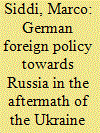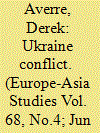| Srl | Item |
| 1 |
ID:
146330


|
|
|
|
|
| Summary/Abstract |
Ukraine’s policy towards Russia since independence in 1991 has been characterised by a predicament: how to preserve its statehood in the context of its heavy economic dependence on Russia, which was intent on Ukraine’s participation in Russian-led integration projects. In this essay we argue that only by understanding the complexities and seeming contradictions in Ukraine’s positioning vis-à-vis Russia can a full understanding of Ukraine’s commitment to Russia’s integration projects be attained. This essay systematically examines Ukraine’s responses to Russia’s initiatives and illuminates the strategy of the Ukrainian elites to extract economic benefits while minimising commitments.
|
|
|
|
|
|
|
|
|
|
|
|
|
|
|
|
| 2 |
ID:
146327


|
|
|
|
|
| Summary/Abstract |
This essay argues that historical and identity factors, economic fears and alienation from the new government in Kyiv were only part of the reason for the rise of the separatist movement in the Donbas, Ukraine, in the spring of 2014. They set a baseline, but one not high enough to account for the creation of two mini-‘Republics’ and a prolonged war, without considering the effect of Russian sponsorship and the role of local elites, mainly from the literal and metaphorical ‘Family’ of former President Viktor Yanukovych.
|
|
|
|
|
|
|
|
|
|
|
|
|
|
|
|
| 3 |
ID:
146333


|
|
|
|
|
| Summary/Abstract |
This essay considers the impact of economic statecraft, used by both Western countries and Russia in the aftermath of Russia’s annexation of Crimea in March 2014, on political economy in Russia. The first part of the essay assesses the impact that economic statecraft had on the performance of the Russian economy in the period 2014–2015. The second half of the essay considers how economic statecraft has shaped the development of the system of political economy in Russia. It is argued that the available evidence indicates that economic statecraft has resulted in several unintended consequences, including the strengthening of elite cohesion, and a creeping ‘securitisation’ of economic policy in Russia.
|
|
|
|
|
|
|
|
|
|
|
|
|
|
|
|
| 4 |
ID:
146329


|
|
|
|
|
| Summary/Abstract |
This essay investigates the shift in Germany’s Ostpolitik approach to Russia as a result of the latter’s increasing domestic authoritarianism and assertive foreign policy, particularly its violations of international law in the Ukraine crisis. This prompted Germany to take the initiative in formulating EU sanctions against Russia. However, Germany has attempted to reconcile the sanctions policy with a diplomatic approach to resolving the Ukraine crisis by seeking ways of engaging Moscow on broader security and economic issues, as Russia is considered an essential factor in European and global security and a key energy supplier. Thus, Ostpolitik has not been abandoned altogether; it continues to play a role and shapes the long-term objectives of Germany’s Russia policy.
|
|
|
|
|
|
|
|
|
|
|
|
|
|
|
|
| 5 |
ID:
146324


|
|
|
|
|
| Summary/Abstract |
The Maidan protests provide us with insights into Ukrainian society and the dynamics of mobilisation more generally. Based on the EuroMaidan Protest Participant Survey, on-site rapid interviews with protesters, interviews with politicians, activists and journalists, and focus groups with ordinary citizens and activists, this essay maps the actors, claims and frames of each phase in the protest cycle. It highlights the diversity of actors and the inability of activists and party leaders to coordinate as the central features of the protests. Our analysis reveals the fluid and contingent nature of cleavages commonly portrayed as fixed and politically salient.
|
|
|
|
|
|
|
|
|
|
|
|
|
|
|
|
| 6 |
ID:
146325


|
|
|
|
|
| Summary/Abstract |
The essay examines the impact of the Euromaidan protests and the subsequent Russian aggression on Ukrainian national identity. It demonstrates that national identity has become more salient vis-à-vis other territorial and non-territorial identities. At the same time, the very meaning of belonging to the Ukrainian nation has changed, as manifested first and foremost in increased alienation from Russia and the greater embrace of Ukrainian nationalism. Although popular perceptions are by no means uniform across the country, the main dividing line has shifted eastwards and now lies between the Donbas and the adjacent east-southern regions.
|
|
|
|
|
|
|
|
|
|
|
|
|
|
|
|
| 7 |
ID:
146328


|
|
|
|
|
| Summary/Abstract |
This essay analyses and discusses the background and the evolution of the conflict in Ukraine in light of the wider contestation between the European Union and Russia. The main argument is that the conflict in Ukraine is first and foremost a symptom and not the root cause of the wider conflict between Russia and the West. The essay puts particular emphasis on examining the problems in the EU’s approach concerning the East. In particular the problems in policy and scenario planning are pointed out. The essay ends with conclusions, warning of the potential for a wider rupture and even conflict between the EU and the West and Russia.
|
|
|
|
|
|
|
|
|
|
|
|
|
|
|
|
| 8 |
ID:
146332


|
|
|
|
|
| Summary/Abstract |
This essay explores Russia’s involvement in the conflict in the Donbas by examining the extent to which Moscow’s contribution has demonstrated a governance approach. We argue that Russia’s engagement has remained in a perpetual state of flux due to contradictions in its policy, shaped by the interaction of a complex set of competing security logics. Opposing the view that Russia’s response is solely a policy of destabilisation, we put forward the view that Moscow’s behaviour has not ruled out a positive engagement in the settlement through the selective practice of certain norms and processes underpinning a governance approach.
|
|
|
|
|
|
|
|
|
|
|
|
|
|
|
|
| 9 |
ID:
146334


|
|
|
|
|
| Summary/Abstract |
The essay examines the qualitative changes in EU–Russian relations which resulted from the 2014 sanctions. Thematic, structural and institutional aspects of the issue are analysed through the ‘level of analysis’ approach. Thematically, policy-specific and implementation measures reinforced an EU–Russian ‘divorce’ both in energy and trade. Structurally, the scope of EU–Russian dialogue narrowed in favour of relations between Moscow and member states, and in multilateral fora; this dialogue also became dependent on Russia–US relations. Institutionally sanctions have led to the growing poverty of transgovernmental and transnational relations. As a result, achievements of previous years have been derailed, and reversal of the negative trends will prove difficult.
|
|
|
|
|
|
|
|
|
|
|
|
|
|
|
|
| 10 |
ID:
146331


|
|
|
|
|
| Summary/Abstract |
This essay uses the concept of security governance to explore the implications of Russia’s intervention in Ukraine for the rules-based security order in Europe. It outlines key ideas in the literature about the post-Cold War European security order with respect to Russia’s role and examines Russian debates on the Ukraine conflict. It then investigates European institutions’ reaction to the conflict in order to understand to what extent Russia’s exclusion (as a result of the West’s policy of containment and deterrence) or self-exclusion now constitutes a structural factor in the security politics of the wider Europe. The essay concludes with the analysis of the challenges facing both Europe and Russia and considers the prospects for re-shaping this order to give meaning to partnership and shared security governance.
|
|
|
|
|
|
|
|
|
|
|
|
|
|
|
|
| 11 |
ID:
146326


|
|
|
|
|
| Summary/Abstract |
The formation of a party system is widely regarded as a key to successful and sustainable patterns of democratisation. In this essay we examine the evolution of the party system in Ukraine, focusing on the extent to which the Euromaidan has addressed previous problems and weaknesses. So far the post-Soviet Ukrainian party system has been exceptionally unstable as electoral legislation, the factional composition of Ukraine’s parliament, and the dominant parties in Ukraine underwent frequent changes. We argue that, despite advances in democratisation as a result of the revolutionary events of 2013–2014, the essential features of Ukraine’s party system have not changed. The legislative, ideological and organisational foundations of the Ukrainian party-political landscape and parliamentary politics have remained fragile.
|
|
|
|
|
|
|
|
|
|
|
|
|
|
|
|